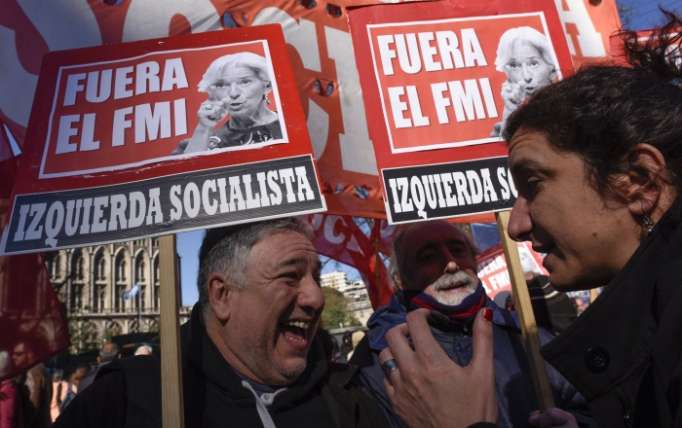"While the IMF’s decision to make more credit available to the country over the next three years has reduced sovereign default risks over this period, things could still turn sour beyond that," Edward Glossop, a Latin America economist at Capital Economics, said. "Argentina has had 22 IMF deals since 1958, and none have restored macroeconomic stability on a sustained basis."
What are the changes?
- A $7.1 billion credit-line increase
- Payments will be delivered at a faster pace
- A zero-deficit target for 2019
- Restrictions on when the central bank can intervene
- Disbursements are no longer precautionary (Argentina will receive funding so long as it meets the conditionality of the agreement)
Stagnation risks
New monetary-policy stipulations would minimize volatility, analysts said, but could pose risks to economic activity. Under the new agreement, Argentina's central bank would only be allowed to intervene under extreme circumstances. A "non-intervention zone" would be set between 34 and 44 pesos per dollar beginning in October.
"We think the main risk of this policy is to generate additional stagnation in economic activity, particularly well into 2019, when we expect some recovery signs to start showing," analysts at HSBC said. That could be especially true if inflation, which is expected to surpass 40% this year, remains well above target.
Meanwhile, economists are predicting the country will fall into a recession by the end of 2018 as the government scrambles to reduce its debt. Gross domestic product fell sharply between April and June, marking the first economic contraction in more than a year, and is expected to continue to slide in coming quarters amid steep spending cuts and export tax increases.
A complicated past
Argentina has had a complicated relationship with the IMF, which has been blamed for worsening the country's economic crisis in 2001. Three years after intervention, which was followed by the largest sovereign default in history, an independent evaluation office within the IMF authored a 193-page report pointing to where it may have gone wrong.
But this plan falls short of requiring a fixed exchange rate, a factor the IMF said played "the central role" in turning Argentina into a crisis country. Trading one-to-one with the dollar, it provided stability for awhile but left policymakers powerless once investor confidence faltered.
Alberto Fernandez, who served as cabinet chief to former President Néstor Kirchner, criticized current President Mauricio Macri on Twitter in May when the IMF announced plans to aid Argentina again. "The only idea that came to Macri is to resort to the lender of last resort," he wrote. "That is the IMF. What a way to smash an economy."
'It's about the politics'
Fiona Mackie, regional director for Latin America at The Economist Intelligence Unit, said the new deal offers a better plan to address inflation and normalize the economy. But she said political uncertainty could cause turmoil in the country.
"The government should be better able to steer policy through a difficult few months and succeed in its adjustment package," she said. "All that said, risks abound, and at this point it's about the politics, and the political capacity to keep the moderate opposition, and voters at large, on side."
Sticking to IMF targets may prove difficult for Macri, a conservative whose campaign focused on free-market reforms, as the October 2019 presidential election approaches. With an approval rating that his dipped below 40% this year, he could risk losing re-election.
"We expect markets to remain unnerved by the possibility that he may not be re-elected next year – a situation that could put the current macroeconomic adjustment program in jeopardy," said Nomura analyst Craig Chan.
Read the original article on markets.businessinsider.com.
More about: Argentina
















































